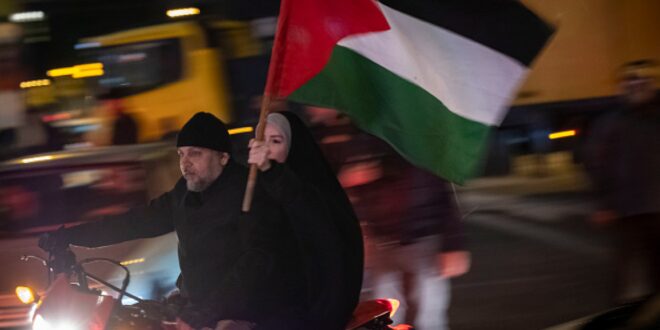Arab countries expressed ‘deep concern’ over an escalation of conflict in the Middle East, following Saturday’s Iranian drone attacks on Israel.
Arab states on Sunday responded to Iran’s retaliatory strikes against Israel, with many expressing “concern” over an escalation of violence, while urging for “restraint” from all parties.
Late on Saturday, Tehran launched at least 200 ballistic missiles and drones at Israel in response to an Israeli strike on the Iranian consulate in Damascus, Syria on April 1.
The attack on the consulate left 13 people dead, including senior commanders of the Islamic Revolution Guard Corps’ (IRGC) Quds Force branch.
Iranian state media said Saturday’s attacks caused “heavy blows” to an air base in the Naqab (Negev) desert, but the Israeli army said there had only been minor damage.
Iranian missile remnants were reportedly found in the Marj Al-Hammam area of Jordan’s capital Amman – which had shot down Iranian drones launched at Israel.
Parts of eastern Syria also were put on high alert as explosions were heard at the Al-Tanf military base, sources affiliated wit the Free Syrian Army confirmed to The New Arab’s Arabic-language site, Al-Araby Al-Jadeed.
Qatar, a key mediator between Israel and Hamas, expressed “deep concern” following the strikes and called on “all parties to halt escalation” and “exercise maximum restraint”. Doha also urged the international community to “take urgent action to defuse the tension and de-escalate.”
Egypt, another mediatory actor in the Gaza war, also said it was “deeply concerned” and echoed Qatar’s plea of “maximum restraint”.
The ministry’s statement also warned of the “risk of the regional expansion of the conflict”, and added that Egypt would be “in direct contact with all parties to the conflict to try and contain the situation”.
Jordan’s Foreign Affairs Minister, Ayman Safadi, released a statement on X saying, “Regional escalation must be prevented. It could push whole region into abyss of war.”
“But 1st step towards de-escalation is ending the Israeli aggression on Gaza & starting to implement the 2-state solution as it is the only path to security & peace for all,” he added.
Saudi Arabia voiced its concern at the “military escalation” and called on “all parties to exercise utmost restraint and spare the region and its peoples from the dangers of war”.
It went on to urge the UN Security Council “to assume its responsibility towards maintaining international peace and security”.
There was major speculation that Riyadh would normalise ties with Israel before Hamas launched a surprise attack on Israel on October 7 and the Gaza war began.
It has however, officially maintained that a deal would only occur if a Palestinian state was established alongside Israel.
Saudi Arabia however has since put any talk of normalisation on ice as a result of the Israel’s brutal war on Gaza.
Iran’s allies in the region joined the attack. with Yemen’s Houthi rebels also launching drones at Israel, according to security agency Ambrey, and Lebanon’s Hezbollah announcing that it had launched rockets at Israeli positions in the occupied Syrian Golan Heights.
Amid Iran’s attacks, Jordan, Iraq and Lebanon closed their airspace, but have since reopened it after concluding that there were no longer “any security concern for civilian aircraft”.
Egyptian national carrier EgyptAir briefly suspended flights to the three countries, but has since resumed them.
Videos online have also shown celebrations in Iran and in some areas of Iraq, in the aftermath of the strikes.
#Statement | The Foreign Ministry expresses Saudi Arabia’s deep concern over the military escalation developments in the region and its serious repercussions and urges all parties to exercise maximum restraint and to protect the region and its people from the dangers of war. pic.twitter.com/k5P1048Nfl — Foreign Ministry 🇸🇦 (@KSAmofaEN) April 14, 2024The hostility between Israel and Iran has triggered fears of a wider conflict in the region.
The strikes come against the backdrop of Israel’s brutal war on the Gaza Strip, which has been ongoing for over a half a year.
Israel’s indiscriminate military onslaught on the Palestinian territory has killed at least 33,729 Gazans since October 7, mostly women and children.
The fatalities are expected to be much higher as thousands still remain trapped under rubble, while a looming famine and the spread of disease are also likely to exacerbate the death toll.
Israel’s war in Gaza has been described as genocide by rights groups.
Iran-allied groups in the Middle East have launched attacks on Israel and what they say are Israeli-linked targets in response.
There have been near-daily clashes between Israel and Hezbollah in Lebanon, and over 300 Lebanese have been killed. Yemen’s Houthi rebels have also attacked commercial ships linked to Israel in the Red Sea.
Additionally, Iran-allied militias have also targeted US military bases in Iraq, Jordan and Syria in response to Washington’s military support for Israel.
Multiple calls for a ceasefire have been made throughout the war, amid international concern for Palestinians in Gaza and a region-wide conflict.
Only one truce has taken place so far in November, which saw the return of 50 Israeli and 19 foreign hostages held by Hamas and other groups, in exchange for 180 Palestinian prisoners.
 Eurasia Press & News
Eurasia Press & News




